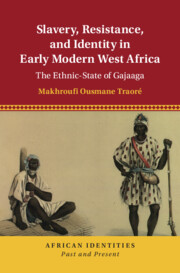Book contents
- Slavery, Resistance, and Identity in Early Modern West Africa
- African Identities: Past and Present
- Slavery, Resistance, and Identity in Early Modern West Africa
- Copyright page
- Contents
- Figures
- Tables
- Preface
- Acknowledgement
- Introduction
- Part I Between the Sahara and the Atlantic Ocean
- Part II Atlantic Slavery, Kingship, and Worship of Nature
- 3 Trans-Saharan and Transatlantic Gajaaga
- 4 Matriarchy, Ecology, and Atlantic Slave Trade
- Part III Gajaaga at the Center, the French Empire at the Edges
- Conclusion
- Bibliography
- Index
3 - Trans-Saharan and Transatlantic Gajaaga
from Part II - Atlantic Slavery, Kingship, and Worship of Nature
Published online by Cambridge University Press: 16 November 2023
- Slavery, Resistance, and Identity in Early Modern West Africa
- African Identities: Past and Present
- Slavery, Resistance, and Identity in Early Modern West Africa
- Copyright page
- Contents
- Figures
- Tables
- Preface
- Acknowledgement
- Introduction
- Part I Between the Sahara and the Atlantic Ocean
- Part II Atlantic Slavery, Kingship, and Worship of Nature
- 3 Trans-Saharan and Transatlantic Gajaaga
- 4 Matriarchy, Ecology, and Atlantic Slave Trade
- Part III Gajaaga at the Center, the French Empire at the Edges
- Conclusion
- Bibliography
- Index
Summary
In this chapter, I detail the historical context of sub-Saharan societies from the fifteenth to the eighteenth centuries, when they were caught between trans-Saharan and transatlantic trade patterns. I examine Arab and European colonial expansion, demonstrating how their common goal in the West African interior was to control the sources of gold and captives. Colonial expansion from Portugal began in the fifteenth century, thus overlapping with that of the Saharan Berbers and Arabs, which persisted from the eleventh into the eighteenth century. This colonial expansion, be it from Arabs or Europeans, had profound repercussions for the geopolitics of the Senegal River, Gajaaga, and the hinterland. Analyzing it offers us a better understanding of violence as the driving force behind the slave trade. At the same time, within this context of slavery and colonial violence, the populations were able to call on a variety of resistance strategies that allowed them to retain decision-making power and room for maneuver. In Gajaaga’s case, for instance, by resisting colonial incursions the Soninke not only maintained territorial sovereignty, but also preserved themselves from slavery. Scrutinizing such forms of resistance likewise reveals a great deal about the feelings of identity that underlay them.
Keywords
- Type
- Chapter
- Information
- Slavery, Resistance, and Identity in Early Modern West AfricaThe Ethnic-State of Gajaaga, pp. 147 - 192Publisher: Cambridge University PressPrint publication year: 2023

